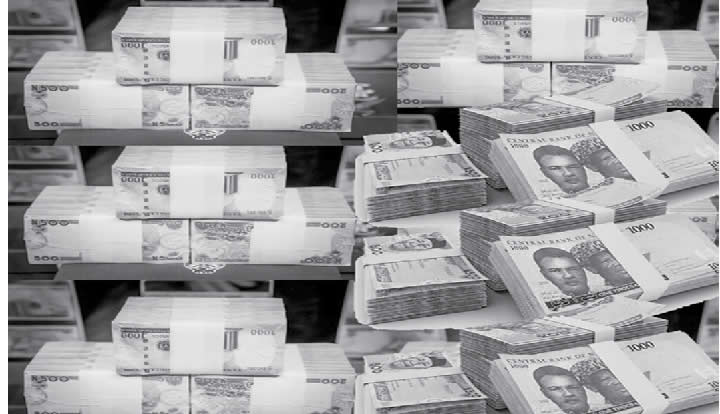
- Traders and fuel stations reject old notes despite supreme court's verdict
The fresh move by some Deposit Money Banks to re-circulate old N500 and N1,000 notes suffered a setback on Tuesday as motorists, fuel stations, retailers, traders, and other categories of bank customers rejected the old currencies.
The development came about 48 hours after some commercial banks, particularly Guaranty Trust Bank Plc, Zenith Bank Plc and Sterling Bank, began the disbursements of the controversial N500 and N1,000 notes across their branches in major Nigerian cities.
Commercial banks’ decision to re-circulate the old notes followed last week’s Supreme Court order approving the use of old N1,000 and N500 and N200 notes as legal tender for 10 months.
The Supreme Court had last Friday ordered that the old naira notes should be allowed in circulation along with the new notes until December 31, 2023.
The court had said the Federal Government’s naira redesign policy contravened the 1999 Constitution.
However, findings on Tuesday revealed that key bank customer groups had started rejecting the re-circulated old N500 and N1,000 notes.
Most of them hinged their arguments on the fact the CBN, the banking sector regulator, had yet to approve the use of the old notes as legal tender, except the old N200 note.
Oil marketers kick
Oil marketers, on Tuesday, refused to collect the old N500 and N1,000 notes from customers in Abuja, Nasarawa and Niger states, insisting that Deposit Money Banks had yet to instruct them to accept the old naira bills.
Some filling stations, particularly those operated by independent oil marketers, and the Nigerian National Petroleum Company Limited, refused to accept the old naira notes on Tuesday despite the order of the Supreme Court and the Central Bank of Nigeria.
At the NNPC Limited’s retail outlet in Nyanya, a major border town between Abuja and Nasarawa State, attendants at the filling station said they had yet to receive instructions from their superiors as regards accepting the old notes.
Similarly, at Khalif filling station, operated by an independent marketer in Kubwa, Abuja, the attendants said they would not accept the old naira bills, but asked customers to pay using a Point of Sale Service machine or via bank transfers.
Aside from filling stations, it was also observed that most traders in the capital city and neighbouring states had yet to start accepting the old notes.
“We are waiting for the presidential directive. The President has not spoken. However, if the banks say we should collect the old notes, of course, we will accept the notes,” the Secretary, Independent Petroleum Marketers Association of Nigeria, Abuja-Suleja, Mohammed Shuaibu, stated.
He added, “But as it is now, we have not got any official confirmation. We are only hearing it from people. Once the banks tell our members to accept it, then I can assure you that we will comply with ease.
“We are hearing that the banks have started giving out the old notes, but as for me, I’ve not set my eyes on the old N500 and N1,000 notes till this minute that I’m speaking to you. We are only hearing it.”
Shuaibu admitted that marketers were aware of the order of the Supreme Court, but insisted that it was a presidential directive to CBN that the old bills should be returned to the banks.
“Well, if they have agreed that the money should be used, as marketers we want the economy to move on smoothly and we are ready to cooperate. But as it is right now, I don’t think the banks have directed their customers to bring the old notes.
“I’ve not heard about such, and at the same time I’ve not seen it, because I don’t know where they are going to manufacture the money, for we were told that the presidential directive was that they should destroy the old notes,” the IPMAN official stated.
Lagos, Ogun motorists
Also, petrol stations and commercial buses in Lagos and Ogun states refused to accept the old naira notes as a medium of payment despite the Supreme Court order.
Findings showed that several petrol stations in Ogun and Lagos rejected the old N500 and N1000 notes from their customers while accepting only the old N200 notes, new notes, Point of Sale payments, and transfers.
We several altercations between sales attendants at filling stations motorists over the old N500 and N1000 notes. Customers who had the old notes were left stranded by station attendants who refused to dispense petrol to those with the old notes.
Passengers were also left hanging at major bus stops across the two states, as most commercial bus drivers refused to accept the N500 and N1000 notes on the grounds that filling stations were yet to commence accepting the same from them when purchasing petrol for their businesses.
A commercial bus plying the Berger-Mowe axis rejected the old N500 and N1000 notes.
Traders kick
Also, several traders were yet to come to terms with accepting the old N500 and N1000 notes.
Checks by our correspondents around the Alagbole-Akute axis of Ogun State revealed that motorists, traders and supermarkets refused to accept the old naira notes due to the confusion surrounding the status of the old currency as a valid means of exchange.
A trader, who identified herself as Bukola Vivian, told our correspondent that the reason behind the rejection of the old naira notes is that Nigerians are more inclined to listening to the directives of the CBN, rather than court rulings.
She said, “Ever since this naira thing started, it is what CBN says that people have listened to, and now the CBN has not said the old notes should be accepted. If I collect old notes now, I can’t give it as change because other people will reject it.”
A Sales Manager at JustRite Superstores, Ojodu Abiodun, who did not want to be named, said the retail giant was also not accepting the old notes.
The source said, “The truth is that not many people have even brought the old notes. Many of the customers here are paying with their cards. We don’t know the status of the old notes for now, so it wouldn’t be wise to start accepting them from customers.”
Transport operators in the axis were not also accepting the old notes from their commuters, insisting that payments should either be done in new notes or via transfers.



